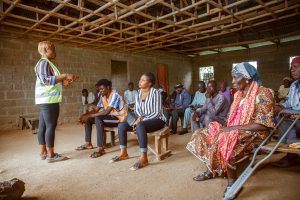Supreme Audit Institutions: Natural Allies to Open Government
Instituciones superiores de auditoría: Aliadas naturales del gobierno abierto
Governments are entrusted with the power to collect, allocate, and spend public funds. Supreme Audit Institutions (SAIs) provide a check on governments’ use of public resources through regular audits of government budgets and expenditures. SAIs provide objective and unbiased information on how public funds are managed – or mismanaged – by making the results of their auditsInstitutional and legal frameworks are necessary for providing assurance of the integrity of financial information and of compliance with budgetary rules and procedure. Technical specifications: These... available to parliaments and the public. This traditional role of SAIs makes them a natural ally to the values that make up the Open Government PartnershipThe Open Government Partnership (OGP) is a multi-stakeholder initiative focused on improving government transparency, ensuring opportunities for citizen participation in public matters, and strengthen... More (OGP): transparencyAccording to OGP’s Articles of Governance, transparency occurs when “government-held information (including on activities and decisions) is open, comprehensive, timely, freely available to the pub... More, citizen participationAccording to OGP’s Articles of Governance, citizen participation occurs when “governments seek to mobilize citizens to engage in public debate, provide input, and make contributions that lead to m... More, inclusionOGP participating governments are working to create governments that truly serve all people. Commitments in this area may address persons with disabilities, women and girls, lesbian, gay, bisexual, tr... More, and accountability.
Let us break down the connection between the role of SAIs and open government:
Transparency
Public funds can be mismanaged or misused, which weakens the impact of government spending on the welfare of lives’ citizens. To counter this risk, citizens should be able to use and access objective and unbiased information on how governments use their powers to collect, allocate, and spend public money. SAIs are one of the main sources for sharing how public resources and money are managed by their governments. Audit reports disclose evidence on how governments operate that would not otherwise be available, including information about the decisions adopted by public entities. For example, during the Ebola outbreak in 2014-15, the SAIs of Liberia and Sierra Leone conducted real-time audits as well as audits in the aftermath of the outbreak. The SAIs audited disbursements, procurements, payroll and asset management, in addition to the financial statements of the projects and entities responsible for managing the response to the epidemic.
Citizen Participation
Oversight mechanisms in SAIs are strengthened with elements of public participationGiving citizens opportunities to provide input into government decision-making leads to more effective governance, improved public service delivery, and more equitable outcomes. Technical specificatio... and transparency. SAIs audit reports disclose information that civil society organizations (CSOs) require to fulfill their role as citizens watchdogs. These reports offer details on the performance of governments, the flaws and problems they are facing to meet their public policy objectives, and potential solutions to address these challenges through the audit recommendations. In addition, SAIs tell civil society whether the information generated by governments is complete, objective, reliable, relevant, and understandable.
SAIs may also incorporate CSO priorities by focusing their future audits on areas of concern for citizens and accommodating their feedback to define the scope of their audit processes. For example, since 2004, the SAI of Argentina has called for an annual meeting with various CSOs for them to suggest audit topics to be included in the following year’s action planAction plans are at the core of a government’s participation in OGP. They are the product of a co-creation process in which government and civil society jointly develop commitments to open governmen.... This mechanism is known as “participatory planning”.
Accountability
SAIs can help public bodies to strengthen accountability for public finances, including the timeliness and reliability of accounting and financial information. By assessing the efficiency and effectiveness of controls and procedures and identifying recommendations to address any shortcomings identified in the audit, SAIs can help prevent corruption. For example, the SAI of South Africa has been collaborating with the institutions that deal with investigations into fraud and corruption relating to COVID-19 spending by sharing its audits findings and data analyses.
Inclusion
The work of SAIs contributes directly to the evaluation of government programs and activities aimed at creating an inclusive society, including UN Sustainable Development Goals, in particular goal 5 (gender equality), goal 10 (reduced inequalities) and goal 16 (promote peaceful and inclusive societies). For example, INTOSAI Development Initiative (IDI) has supported the SAI of Uganda in conducting an audit of “Elimination of Intimate Partner Violence Against Women”. It examines the impact of COVID-19 on intimate partner violence and government efforts to provide an effective, accountable and inclusive institutional framework for eliminating intimate partner violence, especially for the most vulnerable women living with disabilities or in poverty.
Strengthening SAIs can bolster transparency and government oversight. INTOSAI Development Initiative (IDI) is keen to work with the open government community to support efforts oriented at advancing the independence and capacities enhancement of SAIs as part of OGP action plans. In fact, independent, professional, and relevant SAIs are a structural asset to the ongoing open government process across OGP countries.
Los gobiernos tienen el encargo de recaudar, asignar y ejercer fondos públicos. Las instituciones superiores de auditoría (ISA) supervisan el uso de los recursos públicos a través de auditorías continuas de los presupuestos y gastos de los gobiernos. Las ISA ofrecen información objetiva sobre el uso (o mal uso) de los fondos públicos – poniendo a disposición del parlamento y el público los resultados de sus evaluaciones. En ese sentido, las ISA son aliadas naturales de los valores de la Alianza para el Gobierno Abierto (OGP por sus siglas en inglés): transparencia, participación ciudadana, inclusión y rendición de cuentas.
A continuación, explicamos el vínculo entre las ISA y el gobierno abierto:
Transparencia
Los fondos públicos pueden tener malos usos, debilitando los beneficios que los fondos de gobierno abierto pueden tener en el bienestar de las personas. Para contrarrestar este riesgo, la ciudadanía debe tener acceso a información objetiva sobre cómo la ciudadanía debe utilizar su autoridad de recaudar, asignar y gastar los fondos públicos. Las ISA son una de las formas más efectivas de dar a conocer cómo los gobiernos manejan los recursos públicos. Los informes de auditoría publican evidencia sobre cómo operan los gobiernos que, de otra manera, no estaría disponible, incluyendo información sobre las decisiones que toman las instituciones públicas. Por ejemplo, durante el brote de ébola de 2014-2015, las ISA de Liberia y Sierra Leona llevaron a cabo auditorías en tiempo real y tras el brote. Las ISA auditaron los desembolsos, adquisiciones, nóminas y manejo de bienes, además de informes financieros de los proyectos y entidades responsables del manejo de respuesta a la epidemia.
Participación ciudadana
Cuando incorporan elementos de participación pública y transparencia, los mecanismos de supervisión de las ISA se fortalecen. Los informes de auditoría de las ISA publican información que las organizaciones de la sociedad civil (OSC) requieren para desempeñar su papel de supervisión. Estos informes incluyen información importante sobre el desempeño de los gobiernos, las fallas y retos que enfrentan en el cumplimiento de sus objetivos de política pública y posibles soluciones para atender estos retos a través de recomendaciones de las auditorías. Además, las ISA informan a la sociedad civil, evaluando si la información generada es completa, objetiva, confiable, relevante y fácil de entender.
Las ISA también pueden incorporar las prioridades de las OSC, enfocando sus siguientes auditorías en áreas prioritarias para la ciudadanía e incorporando su retroalimentación para determinar el alcance de sus procesos de auditoría. Por ejemplo, desde 2004 la ISA de Argentina convocó a una reunión anual con varias OSC, pidiéndoles sugerencias de temas a incluir en el próximo plan de acción del país. Este mecanismo se conoce como “planeación participativa”.
Rendición de cuentas
Las ISA pueden ayudar a las instituciones públicas a fortalecer la rendición de cuentas de las finanzas públicas, incluyendo la relevancia y confiabilidad de la información financiera y contable. A través de una evaluación de la eficiencia y efectividad de los controles y procedimientos y ofreciendo recomendaciones para atender las fallas identificadas en las auditorías, las ISA pueden ayudar a prevenir la corrupción. Por ejemplo, la ISA de Sudáfrica ha colaborado con las investigaciones encargadas de identificar fraudes y casos de corrupción en relación a los gastos para atender el COVID-19 gracias a que publica los resultados de sus auditorías y análisis de datos.
Inclusión
El trabajo de las ISA contribuye directamente a la evaluación de los programas y actividades de gobierno diseñados para crear una sociedad incluyente, incluyendo los Objetivo de Desarrollo Sostenible, especialmente en objetivo 5 (equidad de género), el objetivo 10 (reducción de la desigualdad), y el objetivo 16 (sociedades pacíficas e incluyentes). Por ejemplo, la Iniciativa de Desarrollo INTOSAI apoyó a la ISA de Uganda para realizar una auditoría de la “Eliminación de la violencia de pareja contra las mujeres”. Este esfuerzo analiza el impacto que tuvo el COVID-19 en la violencia de pareja como un marco institucional efectivo, confiable e incluyente para la eliminación de este tipo de violencia, especialmente para las mujeres más vulnerables que tienen alguna discapacidad o en situación de pobreza.
El fortalecimiento de las ISA puede impulsar la transparencia y la supervisión de los gobiernos. La Iniciativa de Desarrollo INTOSAI está muy interesada en colaborar con la comunidad de gobierno abierto, apoyando esfuerzos orientados a impulsar la independencia y capacidades de las ISA como parte de los planes de acción de OGP. De hecho, las ISA independientes, profesionales y relevantes son un elemento fundamental para el proceso de gobierno abierto de los países.
Related Content

A Decade of Impact – OGP 2021 Annual Report
Read OGP's 2021 Annual Report for a highlights from the year, including reflections on the progress the Partnership has made in its first decade and an ambitious agenda for its…

The Skeptic’s Guide to Open Government – 2022 Edition
Evidence continues to show that open government affects people’s lives. But there are still skeptics who are not aware of all the benefits associated with this approach. Use this guide…

Open Government Partnership Welcomes 30 New Local Governments
Today, 30 local governments join OGP, an international partnership that brings together government and civil society organizations to create ambitious reforms to open up governments and better respond to citizens’…


@AbiertoGob Reply
Hola, me gustaría solicitarles a los administradores del sitio web de la OGP si es posible incluyan las opciones de compartir los artículos en redes sociales, para de esta manera hacer más fácil la divulgación, distribución y que estas entradas puedan llegar a más personas. muchas gracias.